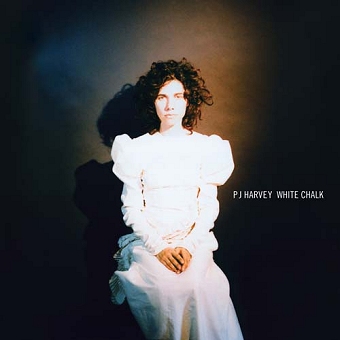This isn’t a list of the “best” songs of 2007, or even my favorites. It’s a personal 2007 compilation that tries to capture my experience with music over the past 12 months. The songs are meant to play off each other – sometimes in obvious ways, often not – and there’s a purpose to the sequencing.
My goal is simple: to give readers some ideas for new listening, or perhaps to spur you to go back to an artist you’d dismissed. There are a lot more familiar names in this year’s mix than last year’s, and that’s because of the accelerating fragmentation of the music market; it seems increasingly difficult for anything to capture the public’s imagination for more than a few seconds.
So here are 18 songs that I felt deserve more love than our short cultural attention span typically allows.
 Noisettes, “The Count of Monte Christo.” Forgive me for finding Amy Winehouse’s acclaimed Back to Black more than a little dull, but for me the soul singer of the year was Shingai Shoniwa of the Noisettes. Like Gnarls Barkley last year, the Noisettes put the heart of soul into a new context. The trio’s What’s the Time, Mr. Wolf? is more in the rock vein than Winehouse’s record and more conventional than Gnarls Barkley’s, but the settings are well-suited to Shoniwa’s versatile voice, covering a range from powdered sugar to full-throated growls, with an endearing squeak that sneaks through occasionally. The band’s songs take nothing for granted, with equally delicious detail in the vocals and the music. “The Count of Monte Christo” is lovely in its core elements – with a delicate interplay of fluttering acoustic guitar and male and female vocals – but the band keeps building on it and taking detours. The pop song is a circular form with its verses and choruses, and while “Count” follows that basic structure, it never treads the same ground twice, always surprising.
Noisettes, “The Count of Monte Christo.” Forgive me for finding Amy Winehouse’s acclaimed Back to Black more than a little dull, but for me the soul singer of the year was Shingai Shoniwa of the Noisettes. Like Gnarls Barkley last year, the Noisettes put the heart of soul into a new context. The trio’s What’s the Time, Mr. Wolf? is more in the rock vein than Winehouse’s record and more conventional than Gnarls Barkley’s, but the settings are well-suited to Shoniwa’s versatile voice, covering a range from powdered sugar to full-throated growls, with an endearing squeak that sneaks through occasionally. The band’s songs take nothing for granted, with equally delicious detail in the vocals and the music. “The Count of Monte Christo” is lovely in its core elements – with a delicate interplay of fluttering acoustic guitar and male and female vocals – but the band keeps building on it and taking detours. The pop song is a circular form with its verses and choruses, and while “Count” follows that basic structure, it never treads the same ground twice, always surprising.
The Good, the Bad, and the Queen, “History Song.” Dreamy pop is usually based on the accumulation of a multitude of layers, with all the sounds melting together. The Damon Albarn-originated super-group The Good, the Bad, and the Queen achieves a similar effect on “History Song” with far less: an acoustic guitar, roller-rink keyboards, a bass, a late-to-the-party piano, and vocals tinged with fatigue and sadness, all distinct in the mix. It’s less a song than a thin, hypnotic slice of floating melancholy.
Modest Mouse, “March Into the Sea.” I’m not sure what’s being done to an accordion before this track really gets going, but it’s an engaging bit of nonmusic that reminds me of rats in a dark space with noses a-twitching, and vermin are invoked in the chorus: “Well, treat me like disease / Like the rats and the fleas / A-ha-ha! A-ha-ha!” This opening track of Modest Mouse’s We Were Dead Before the Ship Even Sank is pointedly odd, with a violent churn of guitars and Isaac Brock’s agitated, unhinged vocals placed aside passages of sing-song quiet.
that reminds me of rats in a dark space with noses a-twitching, and vermin are invoked in the chorus: “Well, treat me like disease / Like the rats and the fleas / A-ha-ha! A-ha-ha!” This opening track of Modest Mouse’s We Were Dead Before the Ship Even Sank is pointedly odd, with a violent churn of guitars and Isaac Brock’s agitated, unhinged vocals placed aside passages of sing-song quiet.
Shannon Wright, “Everyone’s Got Their Own Part to Play.” To those who haven’t followed the career of Shannon Wright, this song might not seem terribly remarkable. Wright has made a handful of albums filled with acid, but this bouncy little piano-based track finds her following the title of the album from which it’s drawn: Let the Light in. It’s her brightest, most accessible work, yet her vocals are still compellingly naked, and her pleading questions – “What’s it like?” and “What’s the point?” – are touchingly earnest. Wright has mellowed and matured, but it hasn’t softened her.
P.J. Harvey, “To Talk to You.” On White Chalk, Polly Jean Harvey is mostly paired with a piano, and while there are other instruments, the album’s cover image dominates any visualization of performance. One imagines Harvey – wearing that unearthly white, stiff Victorian dress – sitting on a bench, playing, in a nearly empty old house with wood floors caked with dust. The piano belongs in a home, not in a recording studio, as its notes wobble ever so slightly.  Harvey’s aggressive wail has been beaten out of her and replaced by a ghostly falsetto. At the end, of course, the audience discovers that she’s been dead all along! I’m kidding about the last bit, but if you’re going to make a movie that involves a dead woman pining, this belongs on your soundtrack.
Harvey’s aggressive wail has been beaten out of her and replaced by a ghostly falsetto. At the end, of course, the audience discovers that she’s been dead all along! I’m kidding about the last bit, but if you’re going to make a movie that involves a dead woman pining, this belongs on your soundtrack.
Tegan and Sara, “Floorplan.” I first saw the twin Quin sisters opening for the Killers a few years back, and their set showed a lot of promise that their records didn’t fulfill – until this past summer’s The Con, which is strong throughout. “Floorplan” is deliberate in its effects – you can hear what each note and instrument is meant to evoke – but it’s precise and economical rather than overly studied. It starts sweetly – “I want to draw you a floorplan / Of my head and heart / I want to give directions” – and turns creepy, with the vocals suggesting an internal conversation/argument and the sentiments darkening toward the possessive: “I want your lungs to stop working without me.”
The Shins, “Spilt Needles.” A synthesizer swells during the first instrumental break, and it sounds broken, as if it had been dropped from a fourth-story window and just barely works. There’s also a carefully placed fragment of distorted guitar. “Spilt Needles” has all the hallmarks of a heavier Shins song, but these little flourishes put some muscle on the famously precious pop outfit. The band’s Wincing the Night Away was a disappointment, but this might be my favorite song of the year, in part because its deviations are radical from the band’s core sound but achieved with small additions, rather than a reinvention.
Serj Tankian, “Lie Lie Lie.” A punchy contribution to the murder-ballad catalog, “Lie Lie Lie” demonstrates the ways in which System of a Down restrained its frontman. Spread across a wider dynamic range and driven by piano, with an Eastern guitar undercurrent, the song’s title is delivered as if it were a “La La La” lullaby, and it perfectly expresses the contradiction of the sweet and brutal. Tankian’s pinched whine will never be a subtle instrument, but in the proper musical context and stripped of his facile politics, it serves rock music well.
 The Avett Brothers, “Die Die Die.” This faux-cheery alt-country ditty shares nothing with Tankian’s aggressive rock, except that the song’s title is delivered as if it were “Da Da Da,” and it too seems a little too gleeful about bidding adieu. An awkward tremulousness in the singing, some imperfect harmonies paired with a banjo, and sugary background vocals – all in complex arrangements for pop music – suggest someone under the spell of love, and there’s a passage drawn straight from ’70s AM radio. The lyrics tell a different story: “You can try to swim the sea / You can try to hold the breeze / You can try to hide the sun / But say goodbye to everyone.” It’s the musical equivalent of somebody muttering a curse under his breath while blinding yo
The Avett Brothers, “Die Die Die.” This faux-cheery alt-country ditty shares nothing with Tankian’s aggressive rock, except that the song’s title is delivered as if it were “Da Da Da,” and it too seems a little too gleeful about bidding adieu. An awkward tremulousness in the singing, some imperfect harmonies paired with a banjo, and sugary background vocals – all in complex arrangements for pop music – suggest someone under the spell of love, and there’s a passage drawn straight from ’70s AM radio. The lyrics tell a different story: “You can try to swim the sea / You can try to hold the breeze / You can try to hide the sun / But say goodbye to everyone.” It’s the musical equivalent of somebody muttering a curse under his breath while blinding yo
u with a brilliant smile.
Art Brut, “Jealous Guy.” London’s Art Brut is a pretty rudimentary garage-rock band, and its songs blend together after a while – all angular, easily digestible hooks and spoken-word singing, with the occasional strong melody. But the lyrics are clever, grounded, and true: “I can’t sleep because I’ve started to question / Whether your ex-boyfriends let you get this much resting.” Eddie Argos has latched onto a relationship reality that should be a source of comfort and used it to turn himself into a ball of anxiety: “I should be flattered that it’s come to this / When you’re satisfied by just a goodnight kiss.” And his response also feels honest: “I’m not going to let you sleep / I’m pulling blankets, and tugging on sheets.”
Kings of Leon, “Charmer.” Its opening bass line sounds stolen from the Pixies, and the rumbling biker guitar could be borrowed from ZZ Top or Queens of the Stone Age. But at the 25-second mark, Caleb Followill lets loose with a hoarse, piercing, shrill something – it’s like a half-formed scream – and even when you’re expecting it, it can startle you. It’s a most unpleasant sound, and you have plenty of opportunities to analyze it. Oddly, it’s perfectly at home in the song (from the Because of the Times album). It pretty much is the song, and the guitar even tries (unsuccessfully) to replicate it. I’m not sure intellectually what purpose it serves, but it’s a real and new and naturally unnatural sound, and those are unfortunately rare. And if rock and roll is defined by what parents hate, this might forever be the epitome of rock and roll.
 Monster Magnet, “Little Bag of Gloom.” Dave Wyndorf’s psychedelic heavy metal has always felt unusually honest, which goes a long way toward offsetting its essential silliness. And every now and again, Wyndorf finds a place of such stripped-down genuineness that he breaks your heart. On this closer for Monster Magnet’s 4-Way Diablo, the singer and songwriter offers the classic break-up song as a dirge, with exhaustion and without bitterness. A guitar provides minimal, mournful augmentation, but the music is mostly a keyboard that sounds unconvincingly like an accordion. It works, as you can imagine him sitting in a bedroom, singing artless truth: “I got a nasty little bruise / Thanks to your last episode.” It ends abruptly, spent, having said all there is to say.
Monster Magnet, “Little Bag of Gloom.” Dave Wyndorf’s psychedelic heavy metal has always felt unusually honest, which goes a long way toward offsetting its essential silliness. And every now and again, Wyndorf finds a place of such stripped-down genuineness that he breaks your heart. On this closer for Monster Magnet’s 4-Way Diablo, the singer and songwriter offers the classic break-up song as a dirge, with exhaustion and without bitterness. A guitar provides minimal, mournful augmentation, but the music is mostly a keyboard that sounds unconvincingly like an accordion. It works, as you can imagine him sitting in a bedroom, singing artless truth: “I got a nasty little bruise / Thanks to your last episode.” It ends abruptly, spent, having said all there is to say.
Grinderman, “Man in the Moon.” From this Nick Cave side project comes a companion piece to the previous selection – similarly spare and downtrodden, but employing a metaphor that feels just right for its subject matter, with one foot in childhood and the other in knowledge: “My daddy was an astronaut / That’s what I was often taught / My daddy went away too soon / Now he’s living on the moon.” The melodic elements come from a keyboard, but there’s this light base of ambient noise underneath, like black ice you don’t notice until you fall down.
Sunset Rubdown, “The Taming of the Hands That Came Back to Life.” With its silly title and lyrics to match, there’s a dork-rock majesty here that’s matched by its galloping music – the crashing of percussion, the symphony of front-and-center keyboards, the guitar that tries to emulate the synthesizers, the self-consciously dramatic vocals. This band, led by Wolf Parade’s Spencer Krug, shares a lot of its sound with Frog Eyes (of which Krug is sometimes a member), but its aggression and oddity are channeled in a way that pulls you closer instead of pushing you away. At heart, “The Taming … ” has a warm melody that’s picked up by the keyboard, the guitar, the background vocals, and the primary singer, and it welcomes you with open arms.
 Radiohead, “Bodysnatchers.” What’s been missing from Radiohead albums – pretty much from the beginning – is any sense of joy. The band’s much ballyhooed In Rainbows was typical: dour, oppressive, calculating, and invigorating – as bracing as an icy shower and about as much fun. (I mean these things as compliments. Really. Mostly.) “Bodysnatchers” has all those elements, but there’s a giddy-up push from the lead guitar with an assist from the drums; a warped guitar creates a dusting of additional percussion; and there are so many different things going on in the left and right channels that the ears become nearly ecstatic. There’s a classic Radiohead moan here, and it jumps the rails after two minutes, and then it finds its way back a minute later after coming together for a jagged climax. We can’t expect the band to be this jazzed all the time, but it sure is nice every now and again.
Radiohead, “Bodysnatchers.” What’s been missing from Radiohead albums – pretty much from the beginning – is any sense of joy. The band’s much ballyhooed In Rainbows was typical: dour, oppressive, calculating, and invigorating – as bracing as an icy shower and about as much fun. (I mean these things as compliments. Really. Mostly.) “Bodysnatchers” has all those elements, but there’s a giddy-up push from the lead guitar with an assist from the drums; a warped guitar creates a dusting of additional percussion; and there are so many different things going on in the left and right channels that the ears become nearly ecstatic. There’s a classic Radiohead moan here, and it jumps the rails after two minutes, and then it finds its way back a minute later after coming together for a jagged climax. We can’t expect the band to be this jazzed all the time, but it sure is nice every now and again.
Queens of the Stone Age, “3’s and 7’s.” Josh Homme also seemed to figure out how to have a little fun this year. Something – perhaps the departure of longtime collaborator Nick Oliveri – drained QOTSA’s 2005 album, Lullabies to Paralyze, of dynamism; any joy in its sludge was intellectual and derived from minor variations. On Era Vulgaris, Homme recaptures some of pop craft that distinguished Songs for the Deaf. “3’s and 7’s” is unremarkably representative of Queens for a while – Homme’s distinctive falsetto in contrast to his carefully constructed layers of hard-rock guitars – but past the two-minute mark it tightens up into an escalating mass of harmonic electric noise, and then veers off into one of his trademark articulate solos; not technically showy, they seem heartfelt and meaningful even though they’re still just guitar solos.
Pelican, “Lost in the Headlights.” Making instrumental heavy metal is tough. Given the limited vocabulary of the genre, it’s nearly impossible to replace the aural variety contributed by vocals, and the result is often brain-numbing. Early in its career, Metallica tried it once an album, most successfully with “Orion.” The Chicago outfit Pelican has three full albums of it, and while I think City of Echoes employs a larger sonic palette at the expense of hooks and energy, “Lost in the Headlights” is an exemplary slab of what the band does well: fully developed, eloquent tunes that take advantage of freedom from vocals rather than trying to remind you through mimicry that they’re not there. A core riff is established at the beginning of this track, but on close inspection you recognize that it’s only repeated once – at the tail end of the four-minute number – and that it acts as a frame rather than a crutch. I wouldn’t call the remainder “symphonic,” but the sophistication and structures are probably closer to classical music than rock.
The White Stripes, “Little Cream Soda.” I’m no White Stripes apologist, and I’ll be the first to admit that the whole shtick has been tired for a few years. But every record from Jack and Meg White has at least one urgent and essential song. Icky Thump’s title track could have been that, but “Little Cream Soda” is even better, more coherent and less digressive. Both follow the same formula: Jack’s voice and his guitar are engaged in friendly but fierce and spastic competition, trying to outdo one another. The fiery, tightly coiled instrument struts and squeals and mocks and rages in a variety of tones while the singer tries to poetry-slam it. The guitar wins.
(This article originally appeared, in slightly different form, in the River Cities’ Reader.)


Sweet. There’s defintely some stuff I hadn’t heard before. Thanks!